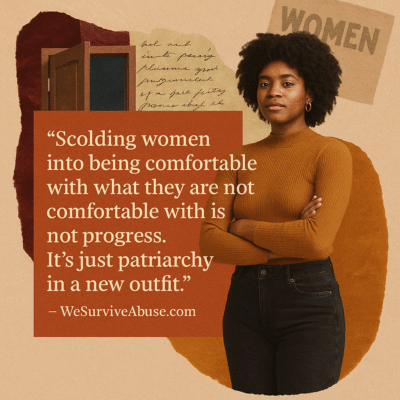Her: I need a protective order. Judge: Did he actually say that he would kill you? Her: Well....no but he said, "That's okay I will take

Her: I need a protective order.
Judge: Did he actually say that he would kill you?
Her: Well….no but he said,
“That’s okay I will take care of you once and for all.”
Judge: So he did not say that he would kill you.
Protective order denied.
“Why doesn’t she just leave?”
Language is powerful.
It shapes how we see the world, how we interact with others, and even how we see ourselves. But what happens when language is twisted and manipulated by abusive people? For women, especially those navigating unhealthy or abusive relationships, understanding this tactic can be a life-changing act of self-preservation.

The Power of Language in Abuse
Throughout history, the most manipulative and destructive people have used language to distort reality. Abusive individuals often weaponize language to gain control. A faithful go-to.
Manipulation through language includes tactics like:
- Gaslighting: Making you doubt your own experiences by saying things like, “That never happens,” or “You’re imagining things.”
- Minimizing: Downplaying your feelings or experiences with phrases like, “You’re overreacting,” or “It’s not that serious.”
- Redefining Terms: Changing the meaning of words or situations to suit their narrative, such as calling control “love” or jealousy “protection.”
These tactics don’t just confuse; they destabilize. When someone manipulates language, they make it harder for you to trust your own judgment or identify harmful patterns. It is important to remind yourself that the deception is intentional.
One common example is when an abusive partner redefines what love and care should look like. They might say:
- “I only get angry because I love you so much.”
- “If you didn’t act like that, I wouldn’t have to yell.”
- “I’m the only one who really understands you.”
- “I feel free to show all of my emotions with you so you have to accept when I go into rages too. You are the only person I can be my full self with.”
- “This is what unconditional love looks like.”
On the surface, these statements might seem like care or even flattery, but they’re designed to make you second-guess yourself and tolerate behavior that you shouldn’t.
Unconditional love does not have to mean tolerating behavior that demeans and destroys you.

This manipulation can have devastating effects, including:
- Loss of Self-Trust: You begin to doubt your instincts, memories, and decisions.
- Isolation: When the language used is “us versus the world,” it becomes harder to seek support from others.
- Emotional Exhaustion: Constantly trying to decipher manipulative language leaves you drained. Self-care means that you protect your energy supply for your own health, well-being, daily living, and survival.
When abusive language goes unchecked, it’s not just the relationship that suffers—it’s your sense of identity and self-worth.

To protect yourself from language manipulation, keep these strategies in mind:
- Trust Your Feelings: If something feels wrong, it probably is. You don’t need anyone to validate your experiences. If it matters to you, it matters.
- Set Boundaries: Often there is no reasoning with people set on manipulating you. Their only goal is to defeat you. Refuse to engage in circular arguments or conversations where your reality is being questioned.
- Seek Clarity: Write down incidents as they happen. This helps you keep track of the truth when someone tries to twist it. Journaling your feelings and conversations as you recall them is a fantastic weapon and shield against bs.
- Talk to Trusted People: Share your experiences with friends, therapists, or support groups who can help you see patterns and validate your perspective.

To create safer environments, we need collective action:
- Call Out Manipulation: When you see someone twisting words to control another person, speak up.
- Support Survivors: Believe women when they say they’ve experienced abuse. Don’t minimize their experiences or tell them to “just get over it.”
- Educate About Language Abuse: Schools, workplaces, and community groups should include training on how manipulative language works and its impact.
Words matter. How we use them has consequences. Abusive people know this, which is why they twist language to suit their needs. But by learning to recognize these tactics and standing firm in your truth, you can reclaim your power.
Let’s commit to building communities where language uplifts instead of oppresses.
Because every woman deserves to live in a world where her voice and reality are respected.